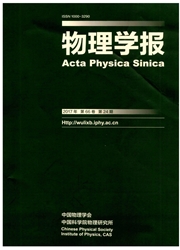

 中文摘要:
中文摘要:
双轻子是研究夸克物质的形成和性质的重要探针.本文基于化学平衡化的黏滞性夸克胶子等离子体演化模型,计算了相对论重离子碰撞能量下金-金对心碰撞形成的夸克胶子等离子体中的双轻子产额.在黏滞性计算中加入了胶子非弹性散射过程对黏滞系数的贡献.相较仅考虑夸克和胶子弹性散射的情况,双轻子的产额有较明显的降低.这表明在黏滞系数中加入胶子非弹性散射的贡献使得系统的演化过程加快,演化时间变短.
 英文摘要:
英文摘要:
Dileptons have large mean free paths due to their small cross sections for electromagnetic interaction in plasma.Therefore they are considered to be an important probe for the formation and evolution of the quark matter. In this work, we calculate the dilepton production of quark-gluon plasma(QGP) produced in Au197+ Au197 central collisions at relativistic heavy ion collider(RHIC) energy based on the evolution model of a chemically equilibrating viscous QGP.The evolution of the QGP system is described by a set of coupled relaxation equations containing the master equations of partons, the equation of baryon number conservation and equation of energy-momentum conservation. Solving the set of evolution equations, one can obtain the evolution of temperature T, quark chemical potential μq, fugacities λq for quarks and λg for gluons. To discuss the shear viscosity of QGP, the contributions of the elastic scattering of quarks qˉq-→ qˉq and gluons gg → gg, as well as the inelastic scattering process of gluons gg ? ggg are included. Based on the evolution model including the viscosity, we perform a complete calculation of the dilepton production, including the processes of quark-antiquark annihilation qˉq→ lˉl, next-order annihilation qˉq→ glˉl, Compton-like scattering qg → qlˉl, ˉqg → ˉqlˉl,multiple scattering of quarks, as well as gluon fusion gg → cˉc, annihilation qˉq→ cˉc. It is found that the spectra from the quark-antiquark annihilations qˉq→ lˉl and qˉq→ glˉl are dominated. The contributions from multiple scattering cannot be neglected. We also find that the dilepton yields remarkably decrease with considering an additional gluon inelastic process in the calculation compared with the results with considering only elastic scatterings of quarks and gluons. This indicates that the evolution of QGP system is accelerated and the evolution time is shortened by the inelastic scatterings of gluons.
 同期刊论文项目
同期刊论文项目
 同项目期刊论文
同项目期刊论文
 期刊信息
期刊信息
